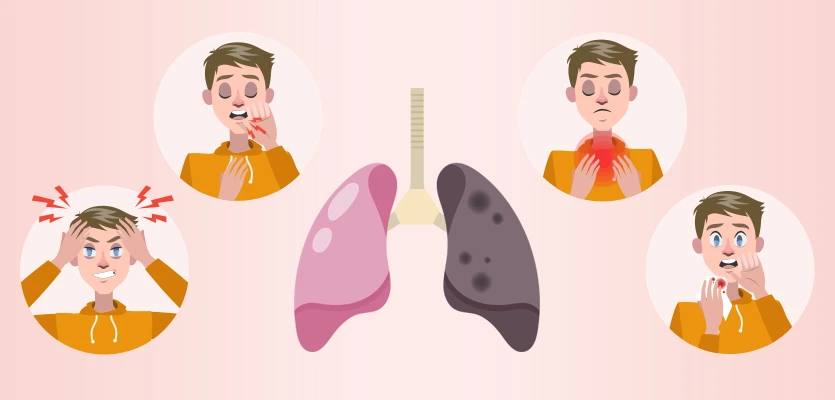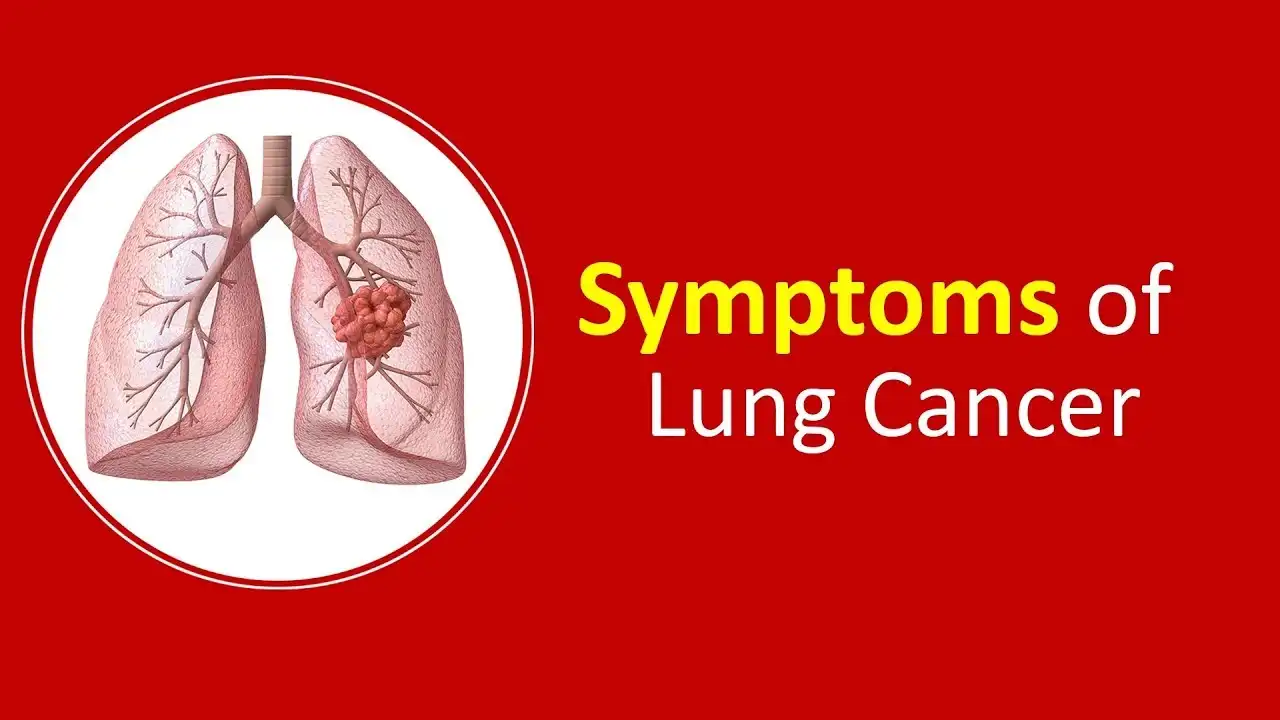The diagnosis of lung cancer can be life-altering and frightening news for any individual. The formation of irregular (malignant) cells in the tissues of the lungs, which are spongy, cone-shaped structures in the chest that aid in breathing, is what is known as lung cancer. The second most frequently occurring cancer in both men and women is lung cancer.
Lung cancer is primarily brought on by active smoking. Smoking causes lung cancer in up to 60% of cases.
Lung cancer is more common in older adults. About two out of every three lung cancer patients, according to the American Cancer Society, are 65 years of age or older.
One of the main causes of cancer-related fatalities globally is lung cancer. Typically, the first signs of lung cancer may not be noticed as this cancer does not exhibit early-stage signs.
The majority of time early signs of lung cancers are not exhibited until the condition is advanced. On the other hand, a mild cough or shortness of breath could be early signs of lung cancer. Lung cancer symptoms, however, vary depending on which section of the lung is afflicted.
Less than 10% of those with late-stage lung cancer are predicted to survive for five years, according to research. Your general health will benefit if you pay attention to some subtle signs and consult a doctor.
Although proper diagnosis and treatment of lung cancer might prolong a persons life, it can still sometimes be fatal. Even though the signs and symptoms of lung cancer have not yet been shown, your body will offer you a variety of indications that something is wrong.
With so many ‘health scares’ nowadays and with a plethora of information now available at the click of a button, we often tend to get confused with the symptoms and assume the worst. For instance, we need to know how signs and symptoms of lung cancer differ from lung infection or how symptoms of lung cancer in men are similar to symptoms of lung cancer in women.
Lung Infection Symptoms
A virus, bacteria, and perhaps even a fungus can all contribute to a lung infection.
When it comes to lung infections, Pneumonia is one of the most typical to occur. The most common cause of pneumonia, which affects the lungs tiny air sacs, is infectious bacteria, though a virus is also capable of doing so. After any nearby infected individual sneezes or coughs, the person becomes more prone to be infected by breathing in the bacteria or virus.
Although pneumonia and other lung infections are typically minor, they can be serious for those with compromised immune systems or long-term illnesses like chronic obstructive pulmonary disease (COPD).
There is some commonality between lung infection symptoms such as pneumonia and lung cancer. The signs of pneumonia are typically more severe right away. Lung cancer typically progresses more slowly and doesn’t show symptoms until it is advanced.
Pneumonia may exhibit mild to severe signs and symptoms which depends on the type of germ that is causing the illness along with your age, and general health. Mild signs and symptoms are mostly similar to cold or flu symptoms, but these last longer.
Lung Infection symptoms or Pneumonia symptoms and signs might include:
- High temperature, perspiration, and chills
- coughing, which could result in phlegm
- breathing difficulty
- a body temperature that is below average ( people with weak immune systems and in elderly adults over 65 yrs )
- diarrhea, vomiting, or nausea
- confusion or shifts in consciousness (in adults of 65 yrs or older)
- Fatigue
- when you cough or breathe, you feel pain in your chest
Also Read : Symptoms of lung infection that should never be avoided
Signs And Symptoms Of Lung Cancer
Although lung cancer is the second most frequent cancer, it is rarely found in its early stages as lung cancer symptoms appear in much later stages. The goal is to identify the early signs of lung cancer so that lung cancer screening will detect the disease when it is still treatable and early.
Unlike some other cancers, lung cancer typically doesn show any symptoms until its far along in its development. Pain and discomfort occur when the tumor enlarges to the point where it presses against other organs. There are occasionally earlier warning symptoms that should be taken as a cue to call the doctor.
Patients who are diagnosed with lung cancer frequently already have a history of lung cancer symptoms like long-lasting breathing problems, frequent respiratory infections, or chest pain.
Although every cough or episode of bronchitis isn a sign that you have lung cancer, its crucial to pay attention to the early warning signs if you are at a high risk of getting the disease.
Common lung cancer symptoms include the following:
A Recurring Cough
A cough that is brought on by a cold or respiratory illness will disappear within a week to ten days. But one of the first indications of lung cancer may be a chronic cough. Additionally, you must not disregard it if you cough more frequently or if you cough up blood. Avoid attempting to ignore a cough that is persistent or producing mucus. Additionally, you should see your doctor right away if you notice any changes in your persistent cough, especially if you smoke.
Chest infection or pneumonia
Another one of the early signs of lung cancer is persistent or chronic bronchitis or pneumonia. Cough, shortness of breath, fever, or chest discomfort are all signs of bronchitis or pneumonia. Immediately consult a doctor if you experience any of these signs.
Breathing Difficulty
One of the early signs of lung cancer might be shortness of breath. An airway is blocked or narrowed by lung cancer, which causes alterations in breathing patterns. After finishing an activity or walking up the stairs, if your breathing becomes difficult, don dismiss it. When your airways tighten or swell, your lungs will make a whistling or wheezing noise. While there are many reasons why this could occur, wheezing is also a sign of lung cancer. It is best to visit your doctor in person to determine the cause.
Chest Pain
Chest pain is one of the late signs of lung cancer. Chest pain may be an indication of blockages in your lungs, such as tumors, swollen lymph nodes, or fluid accumulation. You must pay attention to it if your chest pain gets worse when you breathe deeply, cough, or laugh.
You should also consider the intensity of the pain and whether it is intense, dull, or chronic. One of the warning indications of lung cancer could potentially be a chest infection that does not improve after taking medication. The presence of a developing tumor pressing against your nerve end may also be indicated by persistent chest pain. You must see your doctor right away if you choose to ignore these symptoms.
Hoarseness
Does Your voice sound high-pitched or has it changed recently? Your voice may change, which may be a sign of lung cancer. Your voice alters as a result of lung cancers impact on the vocal cords nerves. If you notice any changes in your voice, you should speak with your doctor.
Body Ache
A worsening of the pain in your back, shoulders, or chest is another one of the early symptoms of lung cancer. Back or other bodily pain can result from lung cancer that has spread to your bones. Bone discomfort worsens at night and gets worse as you move.
Another indication that lung cancer has spread to the brain is headaches. Not all headaches, meanwhile, are caused by brain metastases. You must therefore schedule a doctors consultation to determine the true cause of these pains.
Fatigue or weight loss
Fatigue and weight loss are general signs of lung cancer. Unexpected weight loss or hunger loss may be an indication of a cancerous tumor. Cachexia is the name for weight loss brought on by cancer.
Are Symptoms Of Lung Cancer In Women Different From Symptoms Of Lung Cancer In Men?
Males and females can have different causes of lung cancer and have different life expectancies. Also, men are more likely to get certain types of lung cancer. However, symptoms frequently appear similarly in both the sexes. Lung cancer is the second most frequent cancer and the main reason for cancer fatalities in both men and women, according to the American Cancer Society. However, there are other types of lung cancer that can cause various symptoms and are more common in males than in women.
The common symptoms of lung cancer in men and women may include:
- A cough that lasts more than a few weeks is one of the symptoms that can occur in both men and women, and it is common.
- coughing up blood
- Wheezing
- chest pain,
- coughing for brief periods of time
- having a raspy voice
- recurrent lung infections, such as pneumonia or bronchitis, as a result of the malignant cells clogging the airways atelectasis, which is the collapse of the lungs after cancer has closed the airways
The rates of cancer and cancer-related death varies between males and females despite the similarity of the symptoms. To lower the risk of the condition, additional study is required.
Conclusion
Like other cancers, lung cancer can be treated more quickly if it is diagnosed and managed at an early enough stage. And that might result in a better result. If you are at high risk for lung cancer, be sure to ask your doctor about scheduling a screening and be aware of the symptoms to look out for.
Furthermore, its critical to keep in mind that its never too late to stop smoking or make other lifestyle changes that will lower your risk of developing lung cancer. If you
e prepared to stop, you can gather valuable information without cost through support groups and websites. If you have any inquiries about lung cancers warning signs, symptoms, or diagnosis consult your doctor immediately.
FAQs
1. What are my odds of getting lung cancer if I have the chronic obstructive pulmonary disease (COPD)?
Smoking cigarettes damages the lungs, which can result in lung cancer and COPD. Your unique propensity to acquire lung cancer cannot be predicted by doctors. If you have a history of smoking and are 55 years of age or older, discuss lung cancer screening with your doctor.
2. What can I do to prevent infections of the lungs?
Although lung infections cannot always be avoided, you can reduce your risk by following the advice below:
Avoid touching your face or lips and routinely wash your hands.
Don share food, beverages, or utensils with others.
Stay away from busy areas where viruses can spread quickly.
Avoid smoking tobacco.
Every year to prevent influenza infection, get vaccinated against it.
3. Am I still at risk for lung cancer even though I don smoke?
Patients who have never smoked develop lung cancer at a rate of 70% of all cases. Numerous patients with lung cancer who never smoked also have particular genetic abnormalities that contribute to the development of the disease. These mutations can be found using particular assays. As part of the lung cancer treatment, once the mutation has been identified, doctors can utilize drugs that specifically target it.

.webp)





